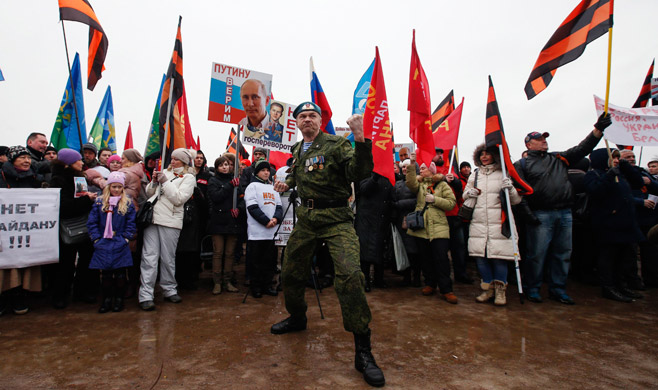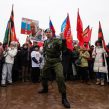
Propaganda Theater and the Anti-Maidan Rally in Moscow
Publication: Eurasia Daily Monitor Volume: 12 Issue: 34
By:

An estimated 32,000 people turned out for an “anti-Maidan” rally in Moscow on Saturday, February 21. The Russian march, condemning the Ukrainian government and its war in the country’s east, began on Moscow’s central Petrovka Street and ended at Revolution Square. The demonstration, which had been approved by the authorities, was designed to celebrate the end of the “year of the Maidan.” It has now been a year since the pro-European revolution in Kyiv that replaced the corrupt regime of former president Viktor Yanukovych, but which was followed almost immediately by the Russian annexation of Crimea and the current conflict in eastern Ukraine. The protesters in Moscow last weekend clearly marched in support of the current Kremlin authorities, as epitomized by a woman witnessed holding a sign saying “Putinism forever.” The protesters also held placards protesting the West, saying “we do not need Western ideology and gay parades” (Mk.ru, February 21).
Other banners at the rally included slogans like “the Maidan today, tomorrow war?” According to reports, representatives of more than 100 organizations were involved, including Russian military officers, the All-Russian International Union of Youth, Cossack groups, and the Christian Rights Center. The rally also included representatives from the Communist Party of the Russian Federation (CPRF), the far-right populist Liberal-Democratic Party of Russia (LDPR), and the so-called party of power, United Russia. Notable persons in attendance at the event were the singer Yulia Chicherina who has earlier performed at a concert in the occupied eastern Ukrainian city of Luhansk, and Alexander Zaidonostov, the president of the extreme nationalist “Night Wolves” motorcycle club (RIA Novosti, February 21). Some reports claimed that the head of the parliament of Novorossiya (“New Russia”—the name the Kremlin has attributed to the region of southeastern Ukraine), Oleg Zarev, in attendance as well (Mk.ru, February 21). The participants in the Moscow anti-Maidan march were thus an assortment of supporters of the nationalist-authoritarian Putinist system, or those in favor of Vladimir Putin’s ideology of “new traditionalism” (Richard Sakwa, Putin Redux: Power and Contradiction in Contemporary Russia, Routledge, 2014).
The president of the Moscow-based Center for Strategic Communications, Dmitry Abzalov, stressed to reporters that the anti-Maidan action “underlined a lack of separation between the political class and Russian citizens, suggesting that the Ukrainian scenario does not work in Russia.” Others, like the political scientist Alexei Zubin, who is a member of the Institute of Socio-Economic and Political Studies Foundation (ISEPI) in Moscow, were more cautious in their public assessments, seeing in the events a rejection by Russian patriots of another Orange revolution but warning also that population’s patriotism could not be measured by a single protest. According to more “reliable” indicators, Zubin estimates that more than 80 percent of Russian citizens support the reunification of Crimea with Russia. And furthermore, those people were prepared to vote for Putin at the next presidential election (TASS, February 21). Conventional commentary on the event, therefore, saw the February 21 demonstration as a sound popular endorsement of the regime.
At the same time, there is another possible interpretation for last week’s Moscow rally. According to some media sources, participants of the anti-Maidan protest consisted primarily of schoolchildren who were offered 300 rubles ($4.78) to take part in the march. The payments were distributed via coupons, which could be exchanged for cash, following the rally. As a result, these reports suggested, not all those in attendance were doing so out of ideological sympathy for the Kremlin’s cause. In particular, there were youths in attendance with the Celtic Cross and “14/88” on their bags—symbols of the international neo-Nazi movement. Their presence was particularly ironic given the widespread assertions by the protest participants that Ukrainians were allegedly recruiting the extreme right-wing organization Right Sector to do the dirty work of the “junta [i.e. the Ukrainian government in Kyiv]” (Novayagazeta.ru, February 21). An eyewitness in the center of the Russian capital, Philip Kireev, posted on his Twitter account that he observed buses bringing people in from outlying regions for the rally, including a group called the “Combat Brotherhood,” a number of Cossacks, and people carrying portraits of Chechen strongman Ramzan Kadyrov (Mk.ru, February 21). Taken together these reports suggest that the regime, in fact, lacks widespread support for its policies regarding Ukraine, at least in Moscow, which was the center of the 2011–2012 opposition street protests that the Russian authorities feared could spark a “color revolution” in the country. While the Putinist regime has often been presented as unassailable in the West (the oft-cited statistic of the Russian president’s approval rating is regularly the prime indicator), such actions suggest a more complicated picture.
Indeed, simultaneous to the anti-Maidan rally, a small pro-Ukrainian demonstration took place near the Teatralnaya metro station in the capital. Thirty individuals, including Ukrainian citizens Oleg Sencova, Alexander Kolchenko and Nadezdha Savchenko, stood waving Ukrainian and Russian flags and held up signs calling for an end to the fighting. The rally was sanctioned by the authorities and proceeded with police protection, although a few minor skirmishes were reported as well. One of the picketers reportedly told a Russian newspaper, “We have held these pickets since the end of April last year. Almost every week we go out on the street to express our opinion about Putin’s policy in Ukraine. We conduct an informal survey of citizens, and it turns out that a lot of people condemn Russian activities in relation to Ukraine” (Kommersant, February 21). It should, of course, be noted that a general climate of patriotic fervor in any country does not encourage people to honestly express dissent. Nevertheless, Saturday’s anti-Maidan rally and its small pro-Ukrainian counter-protest should serve as an important reminder that there continue to be divisions in Russian society over the country’s Ukraine policy, even if these divisions are currently mostly hidden under the surface.




